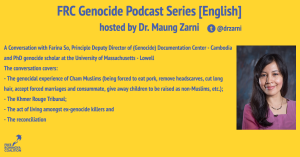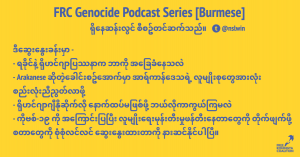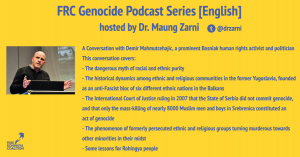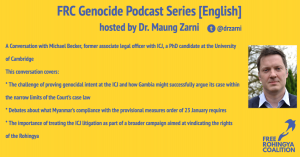
FRC Genocide Podcast Series မြန်မာပိုင်းအစီအစဉ်မှာ ရန်ကုန်-အခြေစိုက် နိုင်ငံတကာသတင်းထောက် Ko Cape Diamond က ပါဝင်ဆွေးနွေးထားပါတယ်။ ရိုနေဆန်းလွင် က စီစဉ်တင်ဆက်ထားပြီး၊ ဒီဆွေးနွေးခန်းမှာ – မြန်မာနိုင်ငံမှာ ရိုဟင်ဂျာနဲ့ ပတ်သက်လာရင် အသုံးအနှုံးတွေ၊ လူ့အခွင့်အရေးစံနှုန်းတွေ ဘာကြောင့်ကွဲပြားနေတာလဲဒီနှစ်ပိုင်းမှာ ပြောင်းလဲလာတဲ့ ရခိုင်ပြည်သူတွေရဲ့ အမြင်ရခိုင်ပြည်နယ်တွင်း သတင်းယူခဲ့စဉ် ရရှိခဲ့တဲ့ အတွေ့အကြုံ၊ ICJ ကြားဖြတ်အစီအမံ နောက်ပိုင်း ပြောင်းလဲမှု ရှိ/မရှိ — စတာတွေ စုံစုံလင်လင် ဆွေးနွေးထားတာကို နားဆင်နိုင်ပါပြီ။






